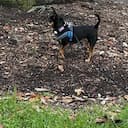Origins and Temperament
Born in the heart of America, the Boston Terrier is a breed with a rich history that dates back to the 19th century. A cross between English Bulldogs and now-extinct English White Terriers, these "American Gentlemen" are known for their distinctive tuxedo-like markings and congenial nature. Boston Terriers are affectionate and sociable, qualities that make them excellent companions but also mean they can be sensitive travelers. Their inherent need for companionship means they require a transport experience that prioritizes comfort and personal touch.
Size and Physical Needs
Boston Terriers are compact, weighing between 10 to 25 pounds, and require moderate exercise to maintain a healthy lifestyle. Due to their short noses or brachycephalic facial structure, they may require a temperature-controlled environment and frequent hydration stops during transport to prevent respiratory distress.
Common Health Considerations
Since Boston Terriers are prone to certain conditions like brachycephalic syndrome, heart murmurs, and joint issues, it's imperative their health records are up-to-date to manage these concerns while traveling. Any necessary health documentation, particularly for air travel, should reflect their current medical status and vaccination history to ensure a worry-free journey.
















